 |
| chicagotimes |
Now that football season is officially over, I’m looking for something to celebrate! I’m in Atlanta, Georgia – a long way from New Orleans, but – I can still enjoy good food in the comfort of my home. So grab some friends, family, neighbors and sample this menu:
(let the good times roll!)
aka FAT TUESDAY – FEBRUARY 28, 2017
OYSTERS BIENVILLE
(Adapted from epicurious)
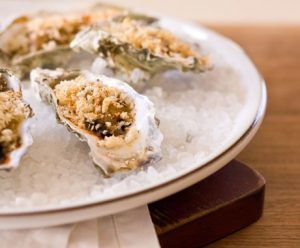 |
| epicurious |
This recipe is from famed Antoine’s in New Orleans.
1 bunch shallots, finely chopped
2 TBSP butter
2 TBSP flour
1/2 cup chopped mushrooms
2/3 cup chicken broth
1 egg yolk
Ice cream salt
1/3 cup dry white wine
Salt and cayenne pepper to taste
2 dozen oysters on the half shell
1/2 cup seasoned bread crumbs
1/4 cup grated Parmesan cheese
Sauté the chopped shallots in the butter and slowly stir over a very low heat until the onions are well cooked, but not brown. Sprinkle the shallots with the flour and cook until the flour begins to brown. Add the chicken broth and the mushrooms and mix well. Beat the egg yolk into the wine and add to the chicken broth mixture, beating all the while. Season with the salt and cayenne, and cook over a low heat for 15 minutes.
Heat a pan of ice cream salt in a 400-degree oven for 15 minutes. Place the oysters on the half shell in the hot ice cream salt and return to the oven for about 5 minutes. Spoon the sauce over each oyster and sprinkle with a mixture of the bread crumbs and cheese. Return to the oven and bake until the bread crumb mixture is lightly browned. Two dozen oysters served this way will serve four.
RATATOUILLE
(Adapted from Emeril Lagasse)
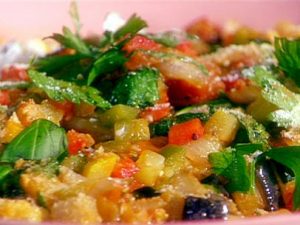 |
| foodnetwork |
1/4 cup olive oil, plus more as needed
1 1/2 cups small diced yellow onion
2 tsp minced garlic
2 cups medium diced eggplant, skin on
1/2 teaspoon fresh thyme leaves
1 cup diced green bell peppers
1 cup diced red bell peppers
1 cup diced zucchini squash
1 cup diced yellow squash
1 1/2 cups peeled, seeded and chopped tomatoes
1 tablespoon thinly sliced fresh basil leaves
1 tablespoon chopped fresh parsley leaves
1/2 tsp red pepper flakes
Salt and freshly ground black pepper
Set a large 12-inch saute pan over medium heat and add the olive oil. Once hot, add the onions and garlic to the pan.
Cook the onions, stirring occasionally, until they are wilted and lightly caramelized, about 5 to 7 minutes. Add the eggplant and thyme to the pan and continue to cook, stirring occasionally, until the eggplant is partially cooked, about 5 minutes.
Add the green and red peppers, zucchini, and squash and continue to cook for an additional 5 minutes.
Add the tomatoes, basil, parsley, red pepper flakes and salt and pepper, to taste, and cook for a final 5 minutes. Stir well to blend and serve either hot or at room temperature.
SHRIMP ETOUFFEE
(Adapted from Emeril Lagasse)
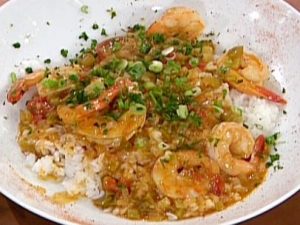 |
| foodnetwork |
6 TBSP unsalted butter
1/2 cup all-purpose flour
4 cups chopped onions
2 cups chopped green bell peppers
2 cups chopped celery
2 TBSP minced garlic
1 (14.5-ounce) can diced tomatoes
2 bay leaves
2 tsp salt
1/2 tsp cayenne pepper
2 TBSP Essence, recipe follows
1 quart shrimp stock
3 pounds medium shrimp (21 to 25 count per pound), peeled and deveined
1/4 cup chopped parsley leaves
Steamed white rice, for serving
1/2 cup thinly sliced green onion tops, for garnish
Bring the mixture to a boil, and reduce to a simmer. Cook the etouffee, stirring occasionally, for 45 minutes. Season the shrimp with the remaining tablespoon of Essence and add them to the pot, stirring to evenly distribute. Cook the shrimp for 5 to 7 minutes, or until they are cooked through. Add the chopped parsley to the pot and stir to combine.
Emeril’s ESSENCE Creole Seasoning (also Bayou Blast):
2 1/2 TBSP paprika
2 TBSP salt
2 TBSP garlic powder
1 TBSP black pepper
1 TBSP onion powder
1 TBSP cayenne pepper
1 TBSP dried oregano
1 TBSP dried thyme
Combine all ingredients thoroughly. Can be made and stored in an airtight container in advance.
1 lb (about 1 quart) shrimp shells and heads
1 cup coarsely chopped yellow onions
1/2 cup coarsely chopped celery
1/2 cup coarsely chopped carrots
3 smashed garlic cloves
1 bay leaf
1 tsp black peppercorns
1 tsp dried thyme
2 tsp salt
Place the shrimp shells and heads in a large colander and rinse under cold running water for several minutes.
Combine the shrimp shells and remaining ingredients in a heavy 6-quart stockpot, add 4 quarts water, and bring to a boil over high heat. Skim to remove any foam that rises to the surface. Reduce the heat to medium-low and simmer, uncovered, for 45 minutes, skimming occasionally.
Remove the stock from the heat and strain through a fine-mesh sieve into a clean container; let cool completely. Refrigerate the stock for up to 3 days or freeze in airtight containers for up to 2 months.
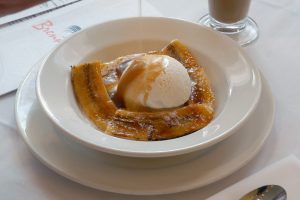 |
| brennans |
1 cup brown sugar
1/2 tsp cinnamon
1/4 cup banana liqueur
4 bananas, cut in half lengthwise, then halved
1/4 cup dark rum
4 scoops vanilla ice cream
Combine the butter, sugar, and cinnamon in a flambé pan or skillet.
Place the pan over low heat either on an alcohol burner or on top of the stove, and cook, stirring, until the sugar dissolves.
Stir in the banana liqueur, then place the bananas in the pan.
When the banana sections soften and begin to brown, carefully add the rum.
Continue to cook the sauce until the rum is hot, then tip the pan slightly to ignite the rum.
When the flames subside, lift the bananas out of the pan and place four pieces over each portion of ice cream.
Generously spoon warm sauce over the top of the ice cream and serve immediately.
SAZERAC
Esquire
 |
| esquire |
2 1/2 oz. rye whisky
2 dashes Peychaud’s bitters
1 dash Angostura Bitters
absinthe
lemon peel
old-fashioned glass
Add several small ice cubes and the rye whiskey,* the Peychaud’s bitters, and the Angostura bitters.**
Stir well and strain into a second, chilled, Old-Fashioned glass in which you have rolled around a few drops of absinthe (no substitute really works, but you can try either a mix of Pernod and green Chartreuse, or Absente) until its inside is thoroughly coated, pouring off the excess.
Garnish with a twist of lemon peel (some insist that this be squeezed over the drink and discarded; Handy wasn’t so picky).
* Esquire says: Use the good stuff, if you can find it: Van Winkle Family Reserve Rye (13 years old), or Sazerac Rye (18 years old).
** Optional. It’s not in the original recipe, but it’s traditional nonetheless, and it’s not bad.
Gold = power
Green = faith

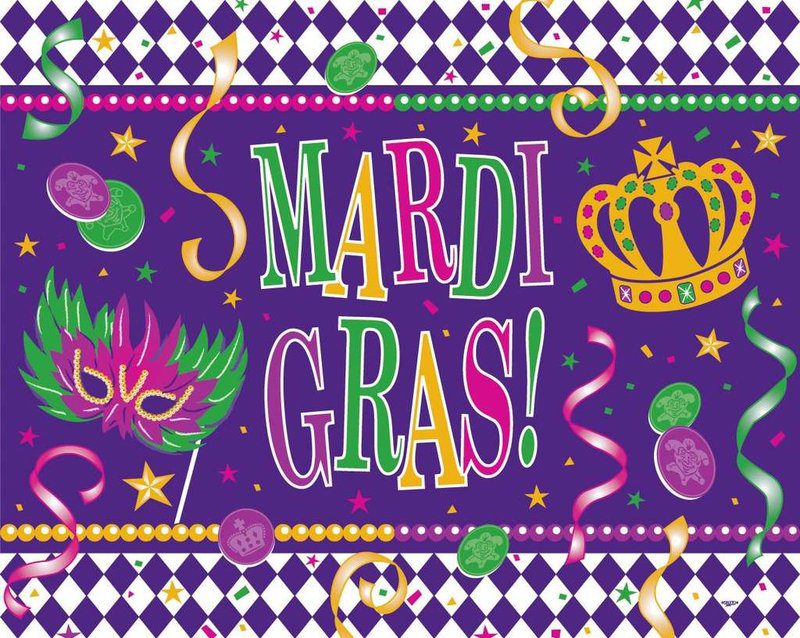

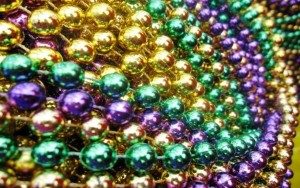
The season was really enjoyable and worth every match. Its good to hear that you have came out and traveled to some new place and hopefully it will be good for you.